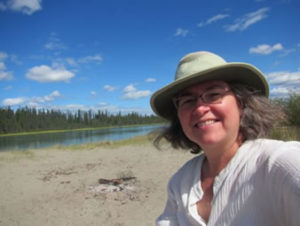About
I was born in Alberta, but spent much of my adult life in B.C. I moved to Whitehorse in 2006 when I married a long-time Yukoner. We both love the Yukon and consider this to be our true home.
I currently have a part-time private counselling practice, serving youth and adults with a wide range of concerns.
I feel blessed to be living in this beautiful territory and by being part of community life here in Whitehorse. If you would like to be in touch please see the contact page.
Grief Guidebook

Guidebook Grief Support for Adults with Intellectual Disabilities
In the pithy words of an old friend, “everything starts with a thought”. The idea for this guidebook arose out of a conversation with a social work colleague. We were both working at Surrey Hospice Society at the time. She was the Bereavement Counsellor, while I assisted volunteers in developing and sustaining supportive relationships with hospice clients and their families.
In addition to our other personal and professional experiences with end-of-life care, both of us had worked for many years with people labeled as having an intellectual disability. It was painfully evident to us both that people with intellectual disabilities often face significant barriers in accessing timely and appropriate bereavement support. My colleague and I reviewed the literature, shared our findings, and collaborated to create a series of workshops that we eventually co-presented. These included presentations at the B.C. Hospice and Palliative Care Association conference in 2007 and at conferences for the B.C. Association for Community Living, 2008 & 2009.
This guidebook is a brief overview of what we had gleaned from research at the time, learned through clinical practice, and through personal experiences. This guidebook may be of particular interest to service providers in residential settings, as well as to family members, social workers, counsellors, and others wishing to be a supportive presence to adults with intellectual disabilities who are living with loss.
There is no charge for this Guidebook. Instead, I ask that you please consider making a donation to an agency or an organization that provides supports to people with disabilities and their families.
To download this Guidebook simply click “Guidebook Grief Support…” at the start of this page.

This work is licensed under a Creative Commons Attribution-NonCommercial-ShareAlike 4.0 International License
Yvette Lepage, M.S.W., R.S.W.
Counselling

“By making a place for wholeness within our relationships, we offer others the opportunity to be whole without shame and become a place of refuge from everything in them and around them that is not genuine. We enable people to remember who they are.”
~ Rachel Naomi Remen
I have a part-time private practice, and over twenty years of experience, providing social work services that have included both short and longer term counselling. I see youth and adults presenting with a range of issues. While not limited to these, I offer therapeutic approaches which aim to foster:
- strengths and resources in resolving emotional struggles
- wellbeing in responding to complex mental health concerns
- deeper connections to oneself as well as with others
- healing of unresolved / unprocessed life experiences
- skillful transitions and coping with significant life events
- adaptation to health-related changes
While I was trained as a generalist, my clinical experience includes 7 years of medical social work in both community hospice and acute palliative care settings. I was also part of an interdisciplinary team, supporting mentally disordered offenders on Vancouver’s downtown east side. Prior to, and throughout my social work career I have provided a range of services to people with developmental and other disabilities.
I continue to pursue training and professional development in various areas of interest, including attachment through the lifespan and ways of enlisting the autonomic nervous system as a resource in managing emotions and processing trauma. In addition to my work with “typical” people, I also offer counselling and long-term therapy to individuals who identify as neurodivergent, including those labelled with FASD.
Over the course of my professional career I have been privileged to companion many individuals and families, often through some of the most challenging times in their lives. I view counselling as a collaborative effort, a relationship that invites all that we are and have been, with the aim of addressing current barriers to wellbeing. In working with me you can expect genuineness, integrity, strict confidentiality, and the benefit of many years of practice experience. For more information, see this Information Information Sheet (2024)
Workshops

Over the years I have developed and facilitated staff training and professional workshops on a variety of topics, including:
- The impacts of trauma on child and adult development
- The therapeutic role of youth workers
- Grief support for adults with intellectual disabilities
- Managing vicarious trauma in bereavement support
- Responding to challenging behaviour in residential care
- Fostering attachment in “hard to reach” youth
- Complicated grief
- Managing health-related change
- Transition planning for youth in care
- Self-care for hospice and palliative care staff
If you are interested in any of the above, or if you have ideas for developing a workshop on a related topic, please get in touch through my contact page.
Contact
Mailing address: P.O. Box 31270, Whitehorse, Yukon, Y1A 5P7
Email: mylepage@proton.me
Cell: 867.689.6462



